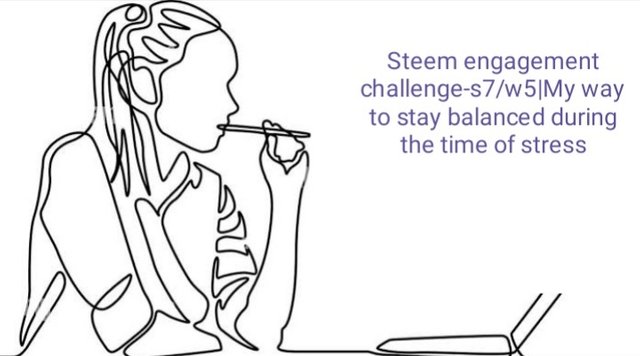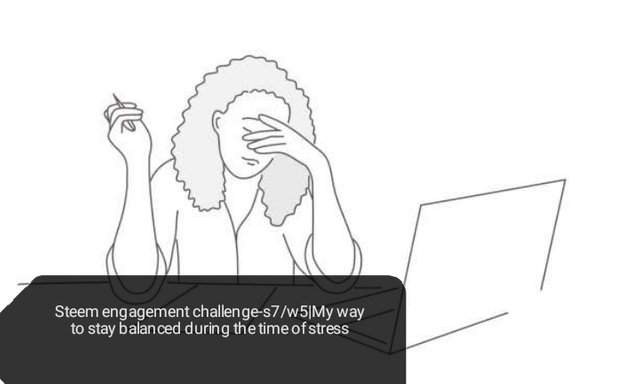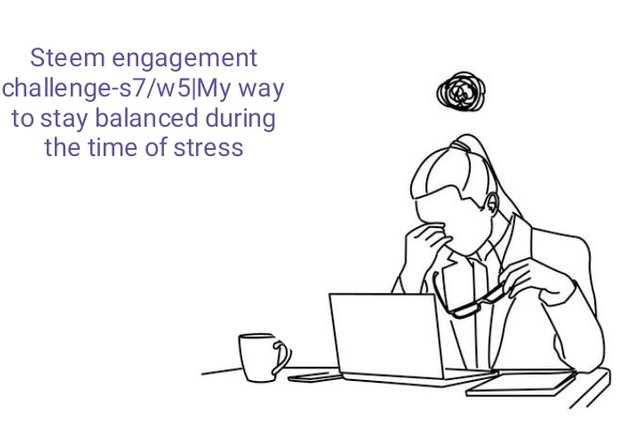Steem engagement challenge-s7/w5|My way to stay balanced during the time of stress student stress

5 ways to manage student stress
(1)Exercise
(2)Mindfulness
(3)Talking to someone
(4)Time management
(5)Getting enough sleep
There are a number of common reactions to stressful circumstances including:
Behavioural - these could involve avoiding or escaping from the situation and turning to alcohol or drugs, a change in appetite or an inability to concentrate.
Physical - you may experience an increased heart rate, sweating, shaking, headaches, butterflies and over-breathing.
Psychological - stress can lead to fear, panic and the feeling that something bad is going to happen.
'Ideally we should engage with stress management strategies all the time as part of our daily and weekly routines, this supports us in responding to challenges and helps to minimise the feeling of complete overwhelm,' explains Louise Gill, wellbeing adviser at Queen Margaret University Edinburgh.
'When you recognise that you have become overwhelmed with stress and are struggling to work through solutions it's a good time to ask for help or adopt strategies to help you manage your triggers more effectively.'

(1)Exercise
This doesn't have to be a gruelling gym session or a ten mile run - you simply need to get your heart racing, for example by going for a brisk walk or a bike ride.
'Regular exercise can help relieve stress in many ways,' says Louise. 'There is breathing centred exercise like yoga and pilates, which is good for grounding and breathing management. Aerobic exercise can equally manage stress hormones, release tension and increase endorphin levels creating a 'feel good' vibe. Team sports and activities can add a social dimension that can additionally support someone with stress management, as we know that social engagement benefits our mental health and wellbeing.'
If you'd like to get moving but are struggling for inspiration see what schemes are available at your institution and get involved with clubs and societies. There's usually an array of activities on offer from hiking to dancing, basketball to boxing and martial arts to cycling.
For example at the University of Leeds you can sign up to the horse riding society, give street dancing a go, join the rollerskating society or try your hand at gymnastics.

.jpeg)
(2)Mindfulness
A relaxation technique originating in Buddhism, mindfulness is a popular coping mechanism for those tackling stress or anxiety. Used by clinicians to improve patients' physical and mental health, it can significantly lower stress levels. It is most often practised through deep breathing or guided meditation.
Alison explains, 'mindfulness can be useful at allowing us time to step away from automatic thoughts and reactions, to remove intensity from our emotions. It is more effective if practiced regularly. There is evidence to show that after eight weeks of regular practice, mindfulness can improve the bodies response to stress and changes the shape of the brain.'
One of the most accessible ways to practice this is through the use of free smartphone apps such as The Mindfulness App, Calm and Headspace. A number of books are also available on the subject.
Also look to see what mindfulness activities are available at your university. At Queen Mary University there’s a mindfulness programme that is free for all students and staff.

(3)Talking to someone
Isolation can have an extremely negative impact on your happiness. Accepting that you need help and talking to someone is often the first step to feeling better.
'Stress thrives in the dark, it convinces us we can't cope, so reach out to people who can help. Talking about what's stressing you out can be useful. Try to be clear on whether you're looking for advice or just need someone to listen,' says Alison.
Speak to your friends and family - they know you best and care about you the most. What's more, studies suggest that socialising with a friend just once a week can reduce your stress levels and improve your mood as much as therapy or counselling.
Talk to other students on your course and you will probably find that you’re not alone. This can help put things in perspective. Ask them what techniques they use to manage stress.
'Sometimes sharing with someone can create perspective as well as lead to additional support options, which can relieve our sense of overwhelm and stress experience,' advises Louise.
Alternatively, make an appointment with your student wellbeing service. The majority of institutions have these and they should be your first port of call if you're worried, stressed or upset about anything. They'll provide a listening ear and can signpost you to specialist services who can offer specific support if needed. While wellbeing services don't provide counselling support, most universities offer free counselling and support groups. Sessions tackle wide-ranging themes, from surviving freshers' week to coping with post-Christmas exam stress.

(4)Time management:
Do you ever feel like there aren't enough hours in the day? Well you're not alone. People often get stressed when they feel that they're running out of time to complete a task - this could be study or work related or even stem from feeling overwhelmed with social activities. However, simple time management techniques can help you to feel more relaxed and focused.
Try creating a written schedule, breaking your tasks down into manageable chunks, planning accordingly and allocating yourself time everyday to relax or socialise. Divide your work into urgent and non-urgent tasks, and important and non-important tasks.
Take a look on your institutions website. Most universities produce useful content pages, skills guides and toolkits to help you get to grips with soft skills such as time management and organisation.

(5)Getting enough sleep
This might sounds like an obvious solution but it's often overlooked. Your mental health and wellbeing relies on you getting enough sleep, as no one functions at 100% when they're tired.
Try to wake up and go to sleep at the same time each day. Seven to eight hours of sleep is recommended. This might not be realistic every night of the week but aim towards this goal more often than not.
'Sleep is important for recuperating the bodies systems and allowing us to process memories. If we don't get enough sleep, this can make us more irritable, impact on our concentration, coordination and memory and make us more vulnerable to mental health problems or exacerbate existing ones,' explains Alison.
Try to do everything you can to relax yourself before going to bed. Take a bath or have a warm shower to wind down, watch your favourite TV show, listen to a podcast or sit quietly and read. Avoid screen time as much as possible and switch off laptops, phones and tablets at least an hour before going to sleep.
If you study in the same room you sleep in put all study materials away.
Hello,
@sidra666
Thank you so much for participating in the Engagement Challenge. A fantastic topic was the fifth week's contest. Overall your presentation was good.
You must participate in the contest as per the criteria in the contest announcement post.
Best wishes for you
Regards:
@mayedul(Moderator)
Thanks Contact is not for competition